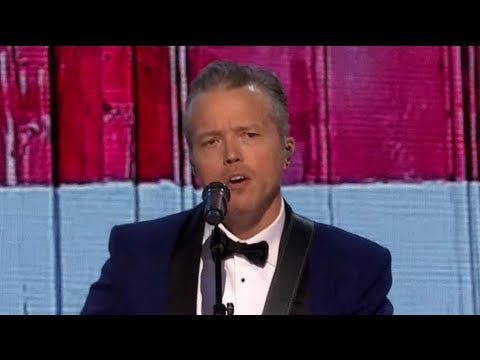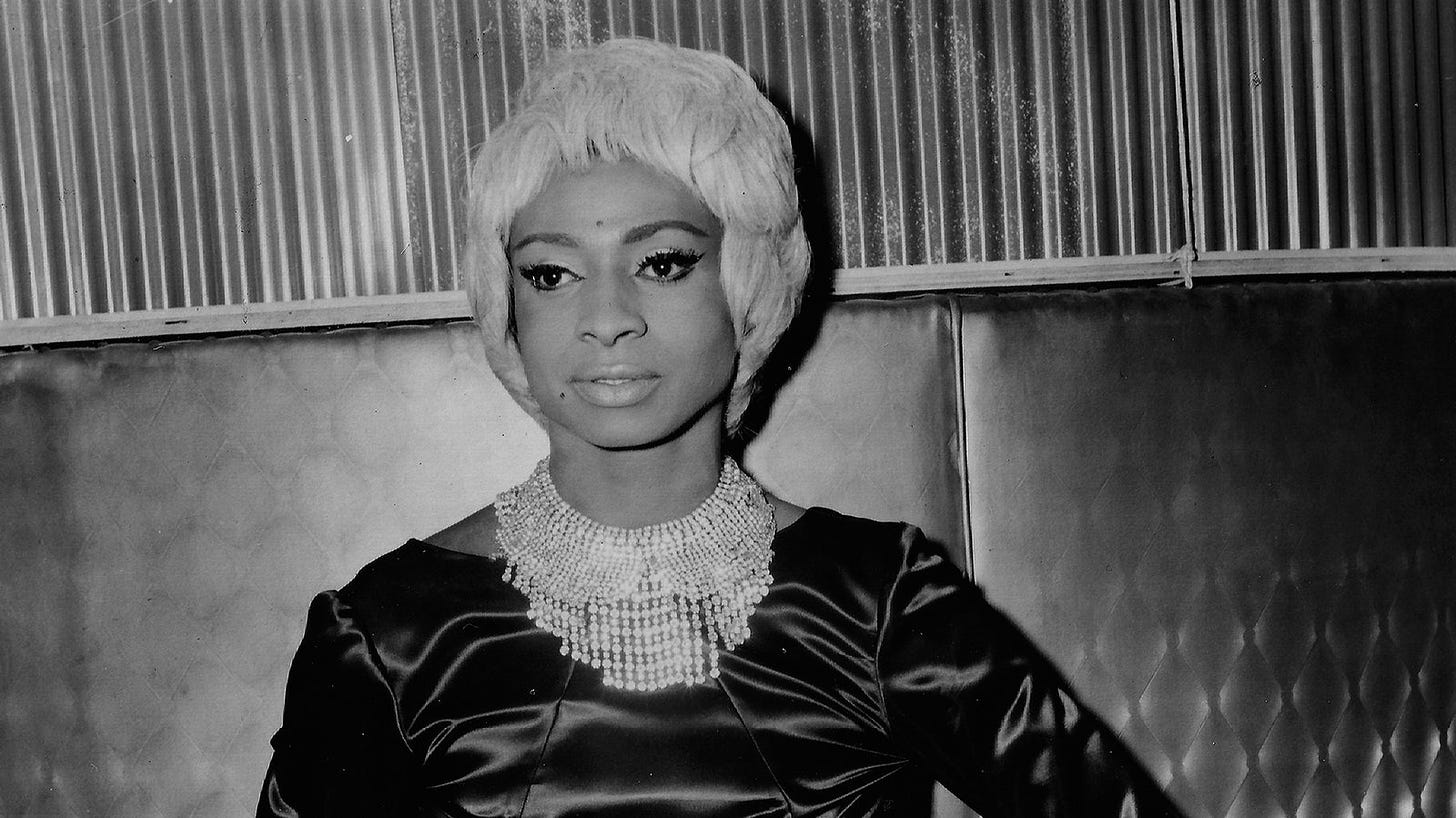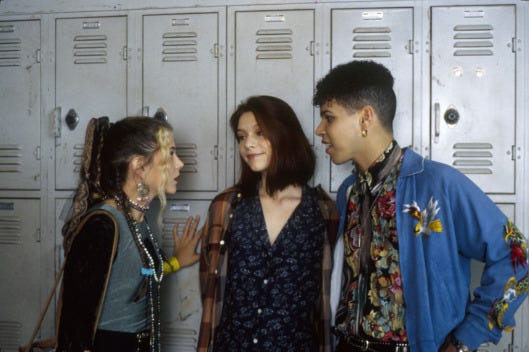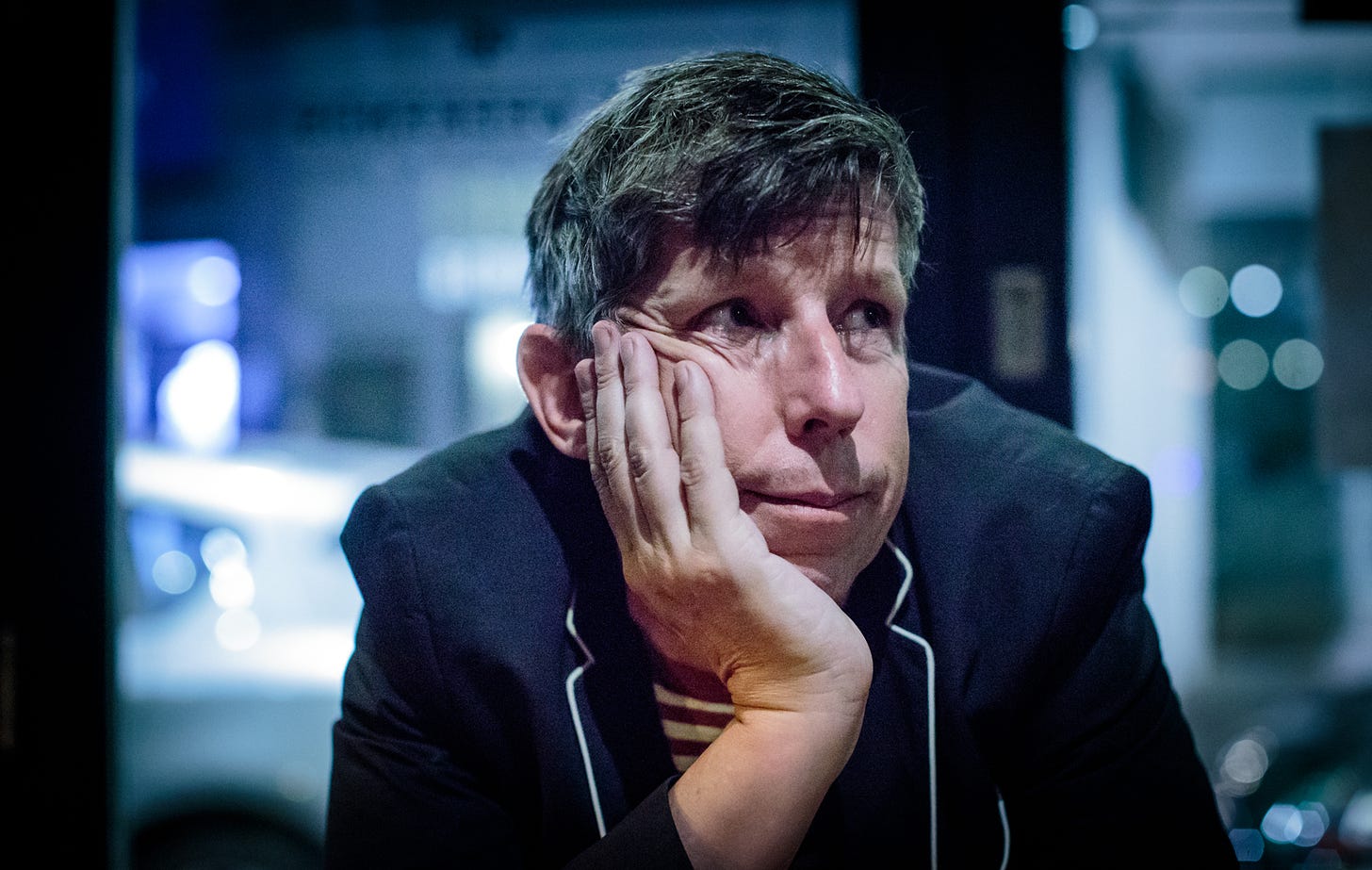To bust up something beautiful
These are a few of my latest favourite things (Coltrane version)
Since last time, I wrote about Sabrina Carpenter for Slate, and guested on a CBC Radio Nova Scotia item about the great midcentury Canadian theatre and film critic Nathan Cohen (inspired by my Toronto arts-criticism history piece in The Local). But let’s get down to new bizness.
KEELE LIFE TOP TEN, AUGUST 2024: PART 1
(Micro-explanations: a) I currently live on Keele St. in Toronto. b) Format borrowed in tribute/with apologies to Greil Marcus.)
1. Jason Isbell, “Something More than Free” at the Democratic National Convention, Aug. 19
Country music truly is having a year. Mickey Guyton’s and Jason Isbell’s appearances at the Chicago Democratic convention, as Marissa Moss wrote in Rolling Stone, seemed to signal “a new understanding from the DNC, that liberals aren’t just listening to streaming pop hits, and that Southern folks, Appalachian residents, and small-town people in general ... often believe in things like basic human rights too.” Or as Black Nashville artist Guyton puts it in the country-meets-gospel anthem she sang in Chicago, “Ain’t we all ‘All-American’?” (I wrote a long Slate piece about Guyton and her struggles back in 2021.)
But when Moss goes on to say a majority of people agree with “Isbell’s ‘Thank God for the work’ message” in “Something More than Free,” that’s only half-right. Yes, that song’s about the dignity of labour. But it’s also about the indignity. About the humiliation and injustice of needing to be grateful for even the shittiest jobs as the benefits flow to rich investors elsewhere. The protagonist’s body is too wrung out on Sundays even to make it to church to thank god in person. If there’s a spirituality to their labour, it’s as much martyrdom as vocation.
I’m sure Isbell intended the positive slant in the context of the DNC, glad to be raising class issues there at all. But with his southern manners, Isbell often presents himself as softer edged than what his songs disclose. As much as any anarchist punk rant, “Something More than Free” is a song that loves the worker but despises the work, and the claim that an honest laborer can thrive in America. You might get that “reward” in heaven, the song says, if that’s not another lie. Or just maybe we should change the damn rules under which “the poor man’s up for sale.”
No doubt Isbell is as happy and relieved as I am at Kamala Harris’s ascent, relative to the past decade of U.S. politics. But Harris is not going to dislodge those rules. She’s not going to stop a lot of us from “drowning in the dirt.” Her victory, however deeply needed, won’t quell many desperate people’s atavistic urge to “go bust up something beautiful we'll have to build again.”
(PS: No matter who else sings there, the most musical performances at any DNC will always be Barack and Michelle Obama’s speeches. Isn’t speaking kinda the main thing about being a politician? How is it none of the others are even close to how good the Obamas are at it?)
2. Any Other Way: The Jackie Shane Story at the TIFF Lightbox, Aug. 28
I first heard about the great 1960s trans R&B performer Jackie Shane more than a dozen years ago, via an Elaine Banks CBC radio special and a Bruce McDonald documentary on Toronto’s postwar Yonge Street music scene. That was long before anyone had tracked Shane down to her home in Nashville and interviewed her, before the Grammy-nominated 2017 Numero Group reissue and the ensuing revival tragically cut short by her death in 2019. I wrote a 2013 Hazlitt piece on Shane I’m still proud of for the historical context about Black drag/trans lineages so many other accounts tend to leave out. But mine carries some awkwardness, too, because we didn’t know for sure then that after leaving Toronto, Shane shifted from drag personae and masculine pronouns to identifying clearly as a woman.
Michael Mabbott and Lucah Rosenberg-Lee’s NFB/Banger Films doc Any Other Way is able to provide a much fuller picture. That’s thanks especially to extensive taped phone interviews with Jackie in her last year of life, as well as the testimonies of friends, and of extended family members who only learned of her after her death but, movingly, are striving now to preserve her legacy.
It fills in the gaps in the visual record with animation, lately an overdone thing in music docs, but executed here with ravishing painterly elegance. However, some of the contemporary fans and analysts interviewed do a bit too much conceptual animation of their own—projecting current frameworks onto a trans person’s experiences half a century ago. This risks substituting generalized assumptions for Shane’s specific story and wishing away too many conundrums. Why did she leave Toronto for California at the turn of the 1970s? We learn she had a boyfriend (whom she later called her husband), but why did that mean they had to go to Pasadena? And then what happened to split them up? (This is where some of the film’s speculation is the most reckless.) We know Shane then moved back to Nashville to care for ailing family members (despite disliking both the city and much of the family), but after they died, why did she continue on there, in near-total seclusion, rather than returning to places where she’d been happier? Above all, why did she never perform again?
The film wants to fill in sociological answers rather than to dwell in the mystery. But it is still the most complete and evocative version of Shane’s story we may ever get. Jump on any screening near you for the performance re-creations alone. No doubt it will soon come to streaming on Canada’s Crave and others. But big-screen it if you can.
3. My So-Called Life at 30, Aug. 25
Claire Danes is 45, everyone. It’s been 30 years since we first heard “go—now—go!” launch the sole season of the greatest teen drama, and my most beloved TV show ever, My So-Called Life, on Aug. 25, 1994. Except I didn’t actually hear it till some six years later, because I had been busy being a young adult when it was on. I had to catch up via DVDs. Having met MSCL as a grownup, I’ve always been as much into the parents’ stories as the kids’—well, except Rickie’s (Wilson Cruz). Being a non-monster, I don’t care for anyone like I care for Enriqué Vasquez.
There was a bunch of press this week to mark the anniversary, including a wonderful interview with the wonderful show creator Winnie Holzman by Matt Zoller Seitz on Vulture, and even a People magazine package that among other things reveals that Holzman’s approach was partly inspired by Barbra Streisand. My top rec to fans, though, would be the Boiler Room podcast by Kristin Russo and Joanna Robinson, made for the 25th anniversary in 2019 and now being rerun via Kristin’s main gig Bufferingcast (and complemented by watchalongs every Sunday night if you need to practice your Claire Danes Cry Faces). Also, do scan YouTube for great cast interviews and other DVD extras—those unnecessarily lost artifacts in today’s streaming formats.
I could go on for pages about MSCL, in dialogue quotations alone (“Excuse me, people throwing themselves at people is, like, the basis of civilization”). But one thing I was mulling over this week was the show’s inciting incident being an early high-school friendship breakup: Angela (Danes) throws over ex-bff Sharon (Devon Odessa) for Rayanne (A.J. Langer). The show is so good on how soul-wrecking this can be, and it’s generous in making new space for Sharon later in the season. But left implicit is how necessary these fractures can be; they’re not always about social climbing and cruelty, as they usually are in the movies. Angela just has to find fresh territory in order to try on new selves. (Freaks and Geeks later picked up this theme and made it more explicit.)
My childhood best friend “dumped” me, as I always say, when I was 13. He was a little older than me, he’d moved to another town a year earlier, and now he’d made new and I assumed cooler friends. So he ghosted me, as we’d say today. It was only decades later when he got back in touch and we rebuilt our friendship that I came to understand how unhappy he was at the time. I wouldn’t have been safe in the crowd he’d fallen into; it wasn’t truly safe for him either. We probably couldn’t have stayed friends. Not that it hurt any less. But then, later in high school, I began in turn to distance myself from the friends of my earlier adolescence, drawn to kids I had more to learn from, artistically and intellectually. It was something I had to do. But of course it also hurt my old friends—I didn’t dump them, but I wasn’t really hanging out.
In adulthood it turns out you never stop having to navigate among social circles across spaces and times, and there are ethical tripwires on every border. The point of My So-Called Life was always that teenagers’ thoughts and dilemmas are as real as anyone else’s, and deserve to be portrayed with the same seriousness (and humour). How perfect to start from the volatility of a friendship triangle, one way that high school really does forecast our so-called lives in full.
Bonus track: Did you know Winnie Holzman is married to the older actor Paul Dooley, who played Angela’s grandfather on MSCL? (And okay, if you did: Did you know that Paul Dooley co-created The Electric Company?!) Either way, relish this video of the two in a short play of Holzman’s called Post-Its, basically a combination of MSCL and the first 10 minutes of Up. Bring, like, kleenex.
4. New Starts, More Break-Up Songs, Aug. 16
If Darren Hayman (once of late 90s-early 00s U.K. band Hefner) is one of our underrated songwriters, it’s partly because he’s asking for it. His songs and hangdog voice are shot through with doubt—self-doubt first, everything-else-doubt second. Successful pop songs have a confidence in their own lovability, their undeniability; Hayman’s songs are not only deniable, they come pre-denied. I love this about them, much the way I love My So-Called Life and so many other simultaneously funny and devastating odes to existential insecurity, because that’s what seems most real to me. But I also can fall for arrogant rogues and divas who declare life’s grander than that. And Hayman can get there, too, when he works up a head of steam, as in the second half of “We Love the City,” one of my top Hefner songs.
Hayman’s also very prolific. Contra the precious myth of inspiration, he seems to figure that if songwriting’s your job, you should do a lot of it. But that feeds into the overlooking, because who knows where to start, and how good can it be if there’s so much of it?
You could do worse than to start with his new album, with his first proper band since Hefner, fittingly called New Starts. Their album is equally aptly called More Break-Up Songs. This is bait on the hook to many of us old Hefner fanciers who imprinted on his songs of gone-askew romance more than later songs about British psychogeography (though some of those are good too, and there also have been solo lovelorn albums like 2020’s Home Time).
I loved this album within approx. 30 seconds, when I noticed the just-blatant-enough way “A Little Stone” echoes and ironizes the Proclaimers’ song of devotion, “I’m Gonna Be (500 Miles).” (Which of course should just be called “500 Miles.”) On that 1988-and/or-1993 hit, over a sturdy march rhythm, the besotted vocalist offers: “When I wake up, I know I’m gonna be/ I’m gonna be the man who wakes up next to you.” Hayman, here, sings atop a raggedy-flagging version of that same march, “In the morning, when you wake up, when you rise/ I won’t be there, I will be gone, I will drive.” Notice he’s not walking, not 500 miles, much less 500 more. Because he’s got a little stone, not even in his shoe, but in his heart, “from July to June.” (Oh wait, that’s all the time!)
Fancy lyrical footwork aside, the song’s as much a showcase for younger noise-punk guitarist Joely Smith and a rhythm section drawn from a London psych-Afrobeat band, all offering Hayman some useful resistance, as if throwing cold water full of electric eels over any temptation to self-pity. As a formal constraint, Hayman decided to accept unquestioningly whatever the other musicians chose to do, like it or not. Obviously his bandmates proved trustworthy, as nothing here devolves into pandemonium, but there’s conspicuously more chaos than Hayman is liable to generate on his own.
My most cherished track, though, is “Asbestos Roof,” the song about aging that I needed in these dwindling days of summer, two parts bitters, one part hope. It’s not my Song of the Summer, but my Song of Lame-Duck Summer, that last trailing leg between Labour Day and the first of autumn. On the off chance anyone else wants to vote for it.
Because it’s
not fair that we’re
not young
but it’s
all right that we’re
undone—
we will
stop time and
dream hard we’re new again ...But it’s
not you and it’s
not me, it’s the
soft light
in between—
we will
bend time and
dream hard we’re new again …
That we’re new again.
5. Doug Paisley, “Pancho and Lefty,” Aug. 9
Townes’ Van Zandt’s “Pancho and Lefty” is the party piece I usually pull out when someone wants me to pretend I can play guitar and sing. But next time I’m going to stumble over the thought of Toronto artist Doug Paisley’s rendition, which excavates undreamt possibilities between the peaks and valleys of Townes’ original guitar line. The way Paisley loosens those bonds, you almost imagine that this time there will be no betrayal, and all the cowboys get to live.
The second half of the inaugural Keele Life Top Ten will be along within a few days.






Another breakup song! The artist is Nyssa and she oozes charisma and energy. Here's the link: https://www.youtube.com/watch?v=oxYJBo6gAhQ
Nice one, Carl :)